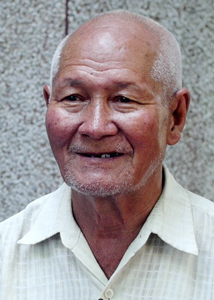Name: Thupten Lodup
(Alias: No)
Gender: Male
Interview Age: 82
Date of Birth: 1935
Birthplace: Naro, Kham, Tibet
Year Left Tibet: 1959
Profession: Monk
Monk/Nun: Currently
Political Prisoner: No

Interview No.: 22U
Date: 2017-04-01
Language: Tibetan
Location: Rajpur, Uttarakhand, India
Categories: Buddhist Traditions
Keywords: army -- Tibetan, Buddhist beliefs, childhood memories, Chinese -- first appearance of, Kham, monastic life, myths/stories, taxes
Summary:
Thupten Lodup was born in 1935 into a middle class family in Naro, Kham Province. His family had a small plot of farmland and grazed animals, most of which belonged to the local monastery. A tax payment in butter was made to the monastery once each year and the family could keep the rest of the dairy products or trade them for grains. After the Chinese invasion, the taxpayers were also required to transport goods for the Tibetan army. When the soldiers mistreated the taxpayers, some of the sought support from the Chinese army.
Thupten Lodup desired from a young age to become a monk and learn to read and write. Soon after joining a local monastery, he was encouraged to join one of the great monasteries in Lhasa. Travelling there around the age of 11, he joined Drepung Monastery, where he was supported by a sponsor who provided him with food. Thupten Lodup is grateful that he memorized many scriptures, studied many Buddhist texts and learned mediation practices.
Thupten Lodup recalls the story of an apparition called Bhungo Sukthil 'Donkey Hooves,' who haunted the monks at the winter assembly. He also explains the annual tradition of shing-long, during which the monks gathered firewood. After the Chinese occupied Lhasa, he escaped to India and was able to continue his Buddhist education and practice in Buxar.
Interview Team:
- Marcella Adamski (Interviewer)
- Tenzin Yangchen (Interpreter)
- Tenzin Choenyi (Videographer)

